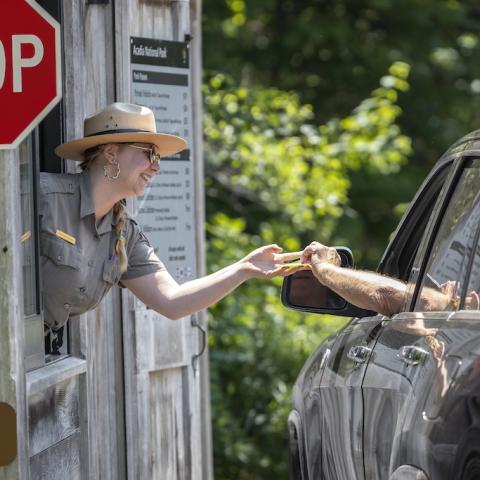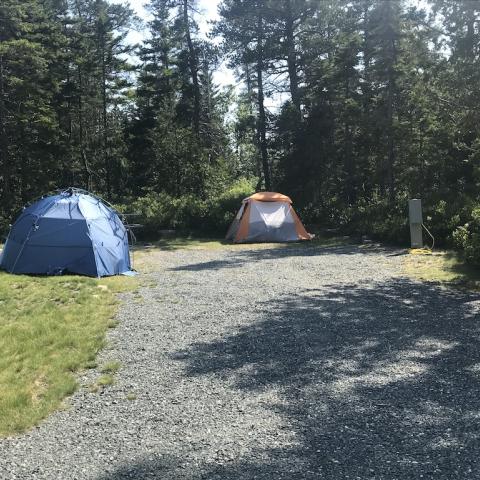
Get ready for a busy 2023 season at Acadia National Park by planning ahead. / Rebecca Latson file
Spring is here and summer is just around the corner. Staff at Acadia National Park are preparing for a busy 2023 season. Park Loop Road will open to motor vehicles on April 15 and the Hulls Cove Visitor Center opens to visitors in May. Campgrounds and other park facilities will open on various dates throughout April and May.
Paving and culvert repair work on Cadillac Summit Road is ongoing, and the road remains closed to all use through Mid-May. Paving and culvert repair work is also ongoing throughout Park Loop Road, which could result in various single lane closures or detours throughout the spring and early summer. Visitors intending to travel to Acadia should keep informed by visiting the park’s website to learn more about current conditions and start planning ahead.
According to the National Park Service, Acadia National Park is one of the most-visited national parks in the United States, with more than four million recreational visits each year. To help you make the most of your trip to Acadia, here is a list of the five top tips.
- Purchase a park entrance pass. All visitors aged 16 and above must have a park entrance pass. All vehicles must display a pass clearly visible through the windshield. Pass purchase options are described fully online at go.nps.gov/AcadiaPass. If you want to drive up the Cadillac Summit Road between late-May and mid-October, you will also need to buy a vehicle reservation. These are only sold online in advance and are not available for purchase in person in the park. Learn more at Recreation.gov.
All sites in park campgrounds require an advance reservation at Recreation.gov. There is no backcountry camping or overnight parking allowed anywhere in Acadia. Accommodations may be available in nearby towns. Visit go.nps.gov/AcadiaChambers. - Try a car-free experience. The fare-free Island Explorer serves most of the park and surrounding communities except Cadillac Mountain. Service begins on the Schoodic Peninsula on May 24, and on Mount Desert Island on June 23. Using the propane-powered bus reduces traffic congestion and air pollution. More at go.nps.gov/IslandExplorer.
- Protect and leash your pet. Pets are welcome in Acadia, but rules apply. Federal law requires that all pets must be kept on a leash no longer than 6 feet (2 m) at all times. Collect and dispose of animal waste in trash containers. Find information about service animals, the Bark Ranger program, and a list of locations where pets are restricted from entry at go.nps.gov/AcadiaPets.
- Play it safe. Your safety depends on your own good judgement. Before setting out on the park’s hiking trails, carefully research hazards and challenges along your planned route. Please do not rely on your cellphone as a map or flashlight. Always carry extra water, a detailed map, warm layers, and foot traction as conditions warrant. Bicycles and horses are not allowed on hiking trails. Check for trail closures and current conditions at go.nps.gov/AcadiaAlerts.
Along Acadia’s carriage roads, pedestrians must yield to horses and cyclists must yield to horses and pedestrians. Only Class 1 E-bikes are allowed on carriage roads. Motorized vehicles and Class 2 & 3 E-bikes are prohibited. In winter, please avoid trampling groomed ski tracks. Pedestrians must yield to horses and cyclists must yield to horses and pedestrians. Only Class 1 E-bikes are allowed on carriage roads. Motorized vehicles and Class 2 & 3 E-bikes are prohibited. In winter, please avoid trampling groomed ski tracks. - Please leave Acadia as you find it. Walk only on designated trails and durable surfaces. Pack out trash and pet waste. Secure food and keep your distance from wildlife. Do not stack rocks or alter cairns used for trail navigation. If you discover a cultural artifact, leave it in place, snap a picture, note the location, and tell a park ranger. Learn more at go.nps.gov/AcadiaTrace.




 Support Essential Coverage of Essential Places
Support Essential Coverage of Essential Places






